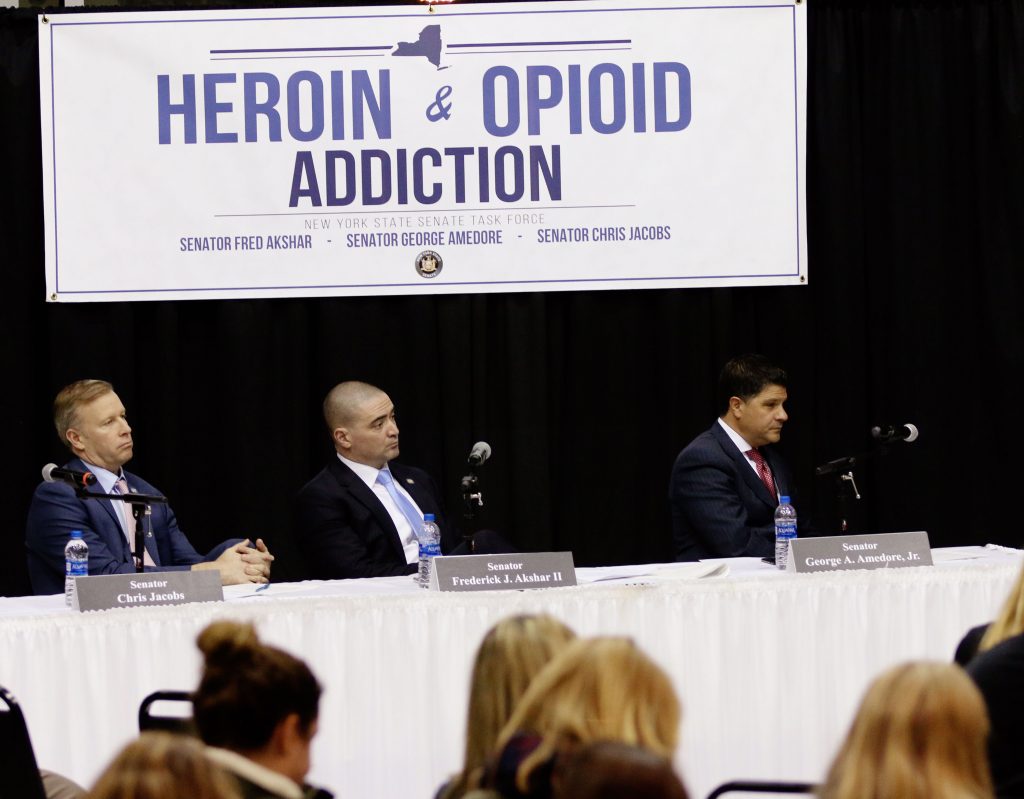
In 2017, there were 479 opioid-related overdoses in Broome County, according to Binghamton Police Chief Joe Zikuski.
On Tuesday, community members explored potential solutions to the opioid crisis with New York state Sen. Fred Akshar and other state officials at a public forum held by the the state Senate’s Joint Task Force on Heroin and Opioid Addiction.
Approximately 100 people gathered at Binghamton University’s Innovative Technologies Complex to tell their stories and listen to 22 oral testimonies addressing Akshar and two other co-chairs, Sen. George Amedore Jr., who represents Montgomery and Greene counties, and Sen. Chris Jacobs, who represents parts of Buffalo and Towanda. The three represented the Senate task force, which was created in 2014 to address the increase of heroin and opioid use across New York state.
The public forum is part of the task force’s tour across the state, in which they invite constituents to suggest policies and solutions.
“It’s incredibly important that my colleagues and I hear from the community at the ground level, from people who are dealing with this issue every single day,” Akshar said. “While we may work our hardest in Albany or at home to deal with this issue, we’re not on the front lines like you.”
The testimonies were split into five panels centered on advocacy, prevention and recovery, treatment, law enforcement and the business community. Many of the speakers work in the health care field, nonprofits and rehabilitation centers or had dealt with substance use disorders themselves.
Jack Seman, the director of the Community Hunger Outreach Warehouse, shared his own struggles with addiction and recovery. Seman said he survived multiple overdoses and was admitted to an inpatient program while homeless and unemployed at 19. He emphasized services must be available for those re-entering their communities after treatment.
“I think more beds is incredibly important, I think that’s what started me in my journey,” Seman said. “However, it really wasn’t the end of the road. Beds at an inpatient facility are getting people on the bus, but I think there needs to be a plan for when they get off.”
Of the overdoses in Broome County, 237 of them occurred in the city of Binghamton, according to Zikuski. Of those who overdosed, 216 were administered the drug naloxone, which blocks the effects of opioids. Many of those present expressed the need for state legislation that mandates all emergency medical services to carry naloxone.
Alexis Pleus, founder and executive director of Truth Pharm, sat on the panel of advocates for solutions to the opioid epidemic. According to Pleus, approximately 7,000 New Yorkers have died from heroin- or opioid-related causes in the last three years.
Truth Pharm, which works to navigate people into treatment, provide family support and raise awareness of substance use disorders, operates without state funding. Pleus urged the senators to direct state funding toward the nonprofit and others like it, as well as to hold medical care providers accountable for the treatment of those who have overdosed.
“The families and the people of New York state rely on us, and we’re not sustainable without funding,” Pleus said. “If we go away, more people will die.”
Other speakers urged the co-chairs to support policies that advocate for harm-reduction measures, jail-based treatment, access to sober housing and access to data. Jeremy Klemanski, president and CEO of Syracuse Behavioral Healthcare, said that in his experience, forums like this one are not usually as calm, with constituents stressing the urgency of the issue.
“People are getting angry around the state because they’re tired of watching people die, especially when they believe that there are ideas that can save some of these people’s lives,” Klemanski said. “I think it’s good that everyone was polite because that’s the way that we should have good public discourse, but I want to make sure that if you haven’t felt or experienced that in other settings, that’s what I’m getting. People are angry.”
Two other public forums will be held later this month at Pace University in Pleasantville, New York and Columbia-Greene Community College in Hudson, New York.


